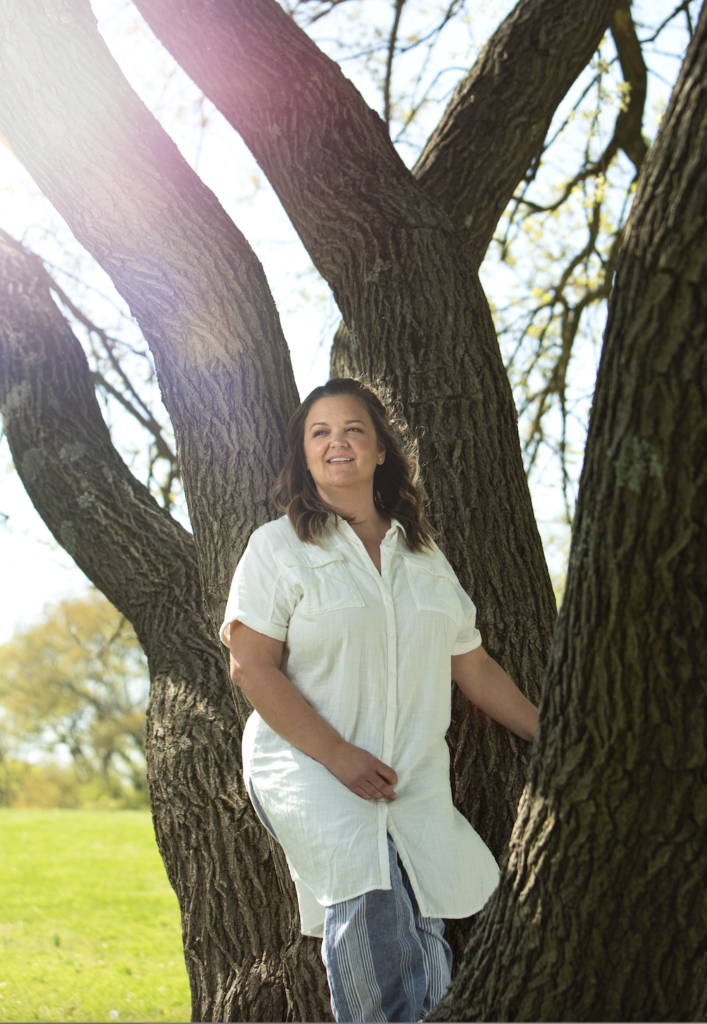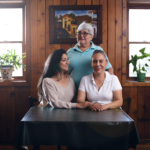Witnessing to Labor
Ritual unites soul with body. Through our attention to what is before us in ritual, we bring ourselves to the present moment, which we inhabit because we have a body to be physically present in. Our body is vessel, container, holding space, a tabernacle to reverence through which we experience the world. We are body and soul, both, in equal measures, in goodness.
So here, we extol the body and all the ways it allows us to move about the world. We pay homage to the cycle of our bodies and the incredible bearing of life they can uniquely do through hearing from a doula who supports women in labor. We talk with restaurateurs who honor the body through feeding and serving people. And we go to recess with children to learn again how to forget ourselves fully through the art of moving our bodies as we play.
May these people and their stories remind us that as we are, we are holy. And may we move through the world eating, playing, letting life in all its forms pass through us, living from this knowledge that by our very existence, we speak of the beautiful, the wonder-full, the very good.
When Marian Johnston gave birth to her two sons, the hospital where she delivered them in Texas offered free doula services. With the support of a doula, Marian delivered quickly without the use of pain medication; the birth of her second son was medically induced. She describes her sons’ births as “magical” and “wonderful.”
But as a hairdresser, these weren’t the adjectives she heard many of her clients using to describe their own childbirth experiences. She says many women who told her their own stories were slightly traumatized from giving birth and had often had unpleasant childbirth experiences.
When Marian and her husband, Nick Johnston, moved to Cape Girardeau with their sons, she decided to become a stay-at-home mother. It was during this time she began thinking about what else she might like to do.
She kept coming back to the desire to create pleasant childbirth experiences for other women like she’d experienced, and she decided to become a doula. In 2018, she got trained and certified through a three-day program with Doulas of North America (DONA) in St. Louis.
“It’s kind of tribal, sometimes. It is,” Marian says of being a doula. “It is so wonderful to be in a room with the laboring mom and her husband and her mother and her sister, because then she truly has her tribe around her, and everyone is like, ‘Go, you can do it, there’s your baby, I can see it, don’t give up.’ And she really has a team of people behind her, helping her through it. It’s incredible. It really is.”
As a doula, Marian gives support emotionally and physically before, during and after a woman gives birth. She does this through meeting with the woman and her partner beforehand to help them make educated decisions and create a birth plan, which is the mother’s idea of what a perfect day would look like while she is giving birth.
When the woman goes into labor, Marian stays in the room with her and her partner for the duration of the birth, supporting them by creating a calm atmosphere in which they can get into meditation if they so choose, through the use of lighting, music, aroma therapy, massage therapy and any other items addressed in the birth plan. She also helps the woman stay cool and hydrated and get in comfortable positions throughout the birthing process. She encourages the woman and her partner throughout the labor and mediates between the couple and professional medical staff to ensure the birth plan is carried out.
A doula doesn’t give medical advice, administer medication or deliver babies. They can work at hospital or home births. Research has shown women who have doulas present during their labor are less likely to request medication for pain and are therefore in labor for a shorter amount of time. They are also less likely to need a Caesarean section.
Marian says approximately half of her clients seek unmedicated births, and half of her clients deliver with the usage of pain medication. Either way, Marian says the process is a beautiful one, and it is her role to support women in whatever decisions they make for the birth of their child.
“Giving birth is a ritual within itself,” Marian says. “You’re really going to see a lot more intention put into birth when there’s less pain medication, letting your body go into labor on its own. Sometimes, that can’t be done, but letting your body go into labor on its own and really focusing [can help] mentally, because you can [sometimes] block yourself from progressing in birth. You can get scared, and you can get stuck. You can get uncomfortable, and you can get stuck, and your body won’t let go to open up and deliver this child. I’ve seen that happen a lot towards the end — it’s hard not to be scared. That’s why it’s important to be there with people and just keep reminding them they’re doing a good job.”
During delivery, she encourages women to break the stereotypical roles they’ve often been socialized into.
“A lot of women, especially heavy thinkers, have a tendency to get kind of embarrassed about the things that are happening [while they’re in labor], whether it’s the sounds they’re making or whether or not they’re positioned to where their bottom is sticking up in the air and things like that, but just assuring them that those loud sounds, that’s normal, and it’s natural, and it’s good. Like, you want to vibrate in your throat, and you want your body to let go of all your inhibitions, just really let it out,” Marian says. “It’s really the best thing you can do.”
After the baby is born, Marian is available to help the mother with breastfeeding if she chooses, and she also checks in on the family a couple of days later to answer their questions and make sure they are adjusting well to their new phase of life.
It’s an adjustment Marian says she remembers as very challenging. She says while she was prepared to give birth and felt “amazing” after it, she was “blindsided” by how hard the first few months of having her newborn would be, and she often felt like everything she did was an “epic fail.”
“It seems like you just have these really long days, but it’s so short. It really doesn’t last very long in the grand scheme of things,” Marian says. “You know, you rest when you can rest — it’s not important to take care of all the other things that you are going to want to take care of. Like, you’re going to want to get up and do your dishes, or you’re going to want to get your house cleaned up because your mother-in-law is coming over, and those kinds of things just aren’t important. What’s important, especially for new moms who are nursing, is to hold your baby. Put your baby skin to skin, and put their little bare chest on your bare chest — that is going to really strengthen that relationship and really just help with bonding. And so just sit still and just breathe it in. It’s okay if you haven’t had a shower. It’s okay if your house isn’t clean. ‘Cause eventually, you’re going to get up and do it, but you don’t have to right now.”
For Marian, it all comes back to creating an environment where women feel supported and comfortable to let their bodies do what they were made to do.
“When women are in labor, they’re very vulnerable, but they’re also very powerful. It’s incredible to witness,” Marian says. “I’m just in awe of women. I’m just in awe. They’re so incredible. I’ve never left a birth without just beaming with pride for the woman that I just saw do that.”
Reading List
Marian recommends:
“The Birth Partner: Everything you need to know to help a woman through childbirth,” by Penny Simkin
“This is my handbook. I carry this around in my doula bag and refer to it all the time; I have pages marked,” Marian says. “It’s helpful for anyone — any kind of partner, not just doulas.”
“Husband-Coached Childbirth: The Bradley Method of natural childbirth,” by Robert A. Bradley
“I wish they would change the name of it — I’ve referred this to same-sex couples before and felt ridiculous,” Marian says. “The husband-coached childbirth is based off of this doctor’s birthing method, the Bradley Method. My husband and I read this together before our first son was born, and this is about having an unmedicated birth in a hospital, so this one’s really, really great because of that.”
“Ina May’s Guide to Childbirth,” by Ina May Gaskin
“Ina May is a really popular midwife. The first half of it is all just birth stories from a place called The Farm in Tennessee which is a birthing center. Some of it’s pretty wild, but it’s really, really great, because it is like women supporting women … and then the second half is her guide to childbirth. I thought it was really weird when I read it, and then when I was in [labor], I couldn’t stop thinking about it.”
“The Womanly Art of Breastfeeding,” by Diane Wessinger
“[Breastfeeding] seems like the sort of thing you can just do naturally, and then it’s no big deal, but it is a big deal, and it’s really hard for a lot of people,” Marian says. “I read this one before I had my second child and really wished I’d read it before I had the first one.”
“The Happiest Baby on the Block: The new way to calm crying and help your newborn baby sleep longer,” by Harvey Karp
“This one is the handbook of all handbooks for people who have just had a baby,” Marian says. “He has something called the five s’s — so you want to lay your baby on his side, give him something to suck on, [swaddle him], make a shushing sound, you want to be swaying, you do all these things, and then you calm your baby. And it really does work.”
What’s in a doula bag?
- Rebozo: a piece of material Marian can wrap around a woman’s waist to pull tight and help open up her hips. This also can assist in helping the woman get into squatting or standing positions for support.
- Cooling rags: these stay cold for hours and help keep a woman cool while she is in labor.
- Bendy straws: to help a woman in labor stay hydrated while she’s laying down.
- Essential oils: lavender and tea tree oil to help clear a woman’s nostrils and airway.
- Massage tools + lotion: to help the woman relax during birth.
- Doula handbook: so Marian is ready for anything.
- Lunch + spare change of clothes + toiletries: Marian stays at the hospital for the duration of each birth, so she packs granola, oatmeal, chapstick and all the essentials for the stay.
Listen to Marian talk about being a doula for flourish Lunch Date on our Facebook page, @flourishwomen, and on Spotify and Apple Podcasts.


